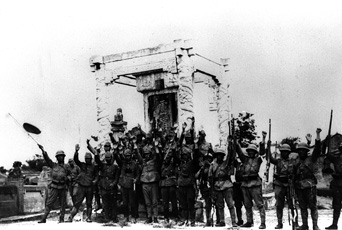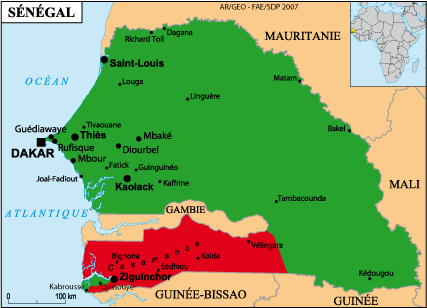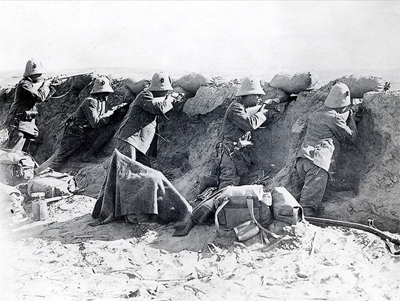Posts Tagged ‘Wars’
Casamance War Heats Up
The Casamance region of Senegal is marked in red on this Senegal Map
The Casamance War in Senegal
The ongoing war in the Casamance region of Senegal pits the Jolo people of the Casamance region against the government of Senegal. The rebels, who call themselves the Mouvement des forces démocratiques de la Casamance (MFDC), seek independence for the region. The Jolo are primarily Christian, while the rest of Senegal is primarily Muslim. Despite a cease-fire arranged in 2004, violence has continued on and off ever since. In 2010, an arms shipment from Iran, bound for the Casamance rebels, was intercepted in Nigeria. In December, 2011, rebels attacked the Senegalese Army, resulting in 12 deaths.
Tweet
http://www.historyguy.com/casamance_senegal_war.html
Iraq War Officially Over For The U.S.
After Eight years and 270 days, the American War in Iraq is now officially over. Defense Secretary Leon Panetta presided over a ceremony in Baghdad on December 15, 2011. In reality, this war truly began when the U.S. intervened in what is now known as the First Iraq War (1990-1991), and then continued with the ongoing No-Fly Zone War (1991-2003) against Saddam’s Iraq.
See also: http://www.historyguy.com/GulfWar2.html
http://www.historyguy.com/no-fly_zone_war.html
http://www.historyguy.com/GulfWar.html
When Was World War Two?
http://www.historyguy.com/worldwartwo/when_was_world_war_2.htm

Japanese soldiers at Marco Polo Bridge.
When Was World War Two?
When was World War Two? This seems like an easy question, but it can be an elusive answer. There are several answers to that question, as many historians debate when World War Two began. The end of World War Two is fairly simple to answer, as the Japanese surrendered on September 2, 1945 in Tokyo Bay.So, when did World War Two begin? Depends on which part of the war you look at.
There are several competing dates for the starting point. If we look at World War Two as a truly global war (which of course it was), and not looking at it from the European or Western point of view, we can pin the answer down to only two dates:
September 18, 1931–The Mukden Incident (also known as the Manchurian Incident) was a pretext for the Japanese invasion and occupation of the region of China known as Manchuria.
July 7, 1937–the Marco Polo Bridge Incident. This is when Japan (one of the Axis powers of World War Two) began its massive invasion of China.
Many historians prefer the 1937 date over the 1931 incident as the Marco Polo Bridge incident led to a major war between China (which became one of the Allies of World War Two), and Japan and Germany had already, in November of 1936, signed an Anti-Comintern Pact that made them allies against the democracies and against the Soviet Union.
The start of the European part of World War Two is a bit clearer, as most historians put the start date with the German Invasion of Poland on September 1, 1939.
Obama’s Speech on the Death of bin Laden
Below is the text of President Obama’s Speech announcing the death of Osama bin Laden. Go to http://www.historyguy.com/obama_bin_laden_dead_speech.htm for the video of his speech and the transcript of the president’s remarks on the killing of bin Laden.
REMARKS BY THE PRESIDENT ON OSAMA BIN LADEN
East Room
11:35 P.M. EDT
THE PRESIDENT: Good evening. Tonight, I can report to the American people and to the world that the United States has conducted an operation that killed Osama bin Laden, the leader of al Qaeda, and a terrorist who’s responsible for the murder of thousands of innocent men, women, and children.
It was nearly 10 years ago that a bright September day was darkened by the worst attack on the American people in our history. The images of 9/11 are seared into our national memory — hijacked planes cutting through a cloudless September sky; the Twin Towers collapsing to the ground; black smoke billowing up from the Pentagon; the wreckage of Flight 93 in Shanksville, Pennsylvania, where the actions of heroic citizens saved even more heartbreak and destruction.
And yet we know that the worst images are those that were unseen to the world. The empty seat at the dinner table. Children who were forced to grow up without their mother or their father. Parents who would never know the feeling of their child’s embrace. Nearly 3,000 citizens taken from us, leaving a gaping hole in our hearts.
On September 11, 2001, in our time of grief, the American people came together. We offered our neighbors a hand, and we offered the wounded our blood. We reaffirmed our ties to each other, and our love of community and country. On that day, no matter where we came from, what God we prayed to, or what race or ethnicity we were, we were united as one American family.
We were also united in our resolve to protect our nation and to bring those who committed this vicious attack to justice. We quickly learned that the 9/11 attacks were carried out by al Qaeda — an organization headed by Osama bin Laden, which had openly declared war on the United States and was committed to killing innocents in our country and around the globe. And so we went to war against al Qaeda to protect our citizens, our friends, and our allies.
Over the last 10 years, thanks to the tireless and heroic work of our military and our counterterrorism professionals, we’ve made great strides in that effort. We’ve disrupted terrorist attacks and strengthened our homeland defense. In Afghanistan, we removed the Taliban government, which had given bin Laden and al Qaeda safe haven and support. And around the globe, we worked with our friends and allies to capture or kill scores of al Qaeda terrorists, including several who were a part of the 9/11 plot.
Yet Osama bin Laden avoided capture and escaped across the Afghan border into Pakistan. Meanwhile, al Qaeda continued to operate from along that border and operate through its affiliates across the world.
And so shortly after taking office, I directed Leon Panetta, the director of the CIA, to make the killing or capture of bin Laden the top priority of our war against al Qaeda, even as we continued our broader efforts to disrupt, dismantle, and defeat his network.
Then, last August, after years of painstaking work by our intelligence community, I was briefed on a possible lead to bin Laden. It was far from certain, and it took many months to run this thread to ground. I met repeatedly with my national security team as we developed more information about the possibility that we had located bin Laden hiding within a compound deep inside of Pakistan. And finally, last week, I determined that we had enough intelligence to take action, and authorized an operation to get Osama bin Laden and bring him to justice.
Today, at my direction, the United States launched a targeted operation against that compound in Abbottabad, Pakistan. A small team of Americans carried out the operation with extraordinary courage and capability. No Americans were harmed. They took care to avoid civilian casualties. After a firefight, they killed Osama bin Laden and took custody of his body.
For over two decades, bin Laden has been al Qaeda’s leader and symbol, and has continued to plot attacks against our country and our friends and allies. The death of bin Laden marks the most significant achievement to date in our nation’s effort to defeat al Qaeda.
Yet his death does not mark the end of our effort. There’s no doubt that al Qaeda will continue to pursue attacks against us. We must –- and we will — remain vigilant at home and abroad.
As we do, we must also reaffirm that the United States is not –- and never will be -– at war with Islam. I’ve made clear, just as President Bush did shortly after 9/11, that our war is not against Islam. Bin Laden was not a Muslim leader; he was a mass murderer of Muslims. Indeed, al Qaeda has slaughtered scores of Muslims in many countries, including our own. So his demise should be welcomed by all who believe in peace and human dignity.
Over the years, I’ve repeatedly made clear that we would take action within Pakistan if we knew where bin Laden was. That is what we’ve done. But it’s important to note that our counterterrorism cooperation with Pakistan helped lead us to bin Laden and the compound where he was hiding. Indeed, bin Laden had declared war against Pakistan as well, and ordered attacks against the Pakistani people.
Tonight, I called President Zardari, and my team has also spoken with their Pakistani counterparts. They agree that this is a good and historic day for both of our nations. And going forward, it is essential that Pakistan continue to join us in the fight against al Qaeda and its affiliates.
The American people did not choose this fight. It came to our shores, and started with the senseless slaughter of our citizens. After nearly 10 years of service, struggle, and sacrifice, we know well the costs of war. These efforts weigh on me every time I, as Commander-in-Chief, have to sign a letter to a family that has lost a loved one, or look into the eyes of a service member who’s been gravely wounded.
So Americans understand the costs of war. Yet as a country, we will never tolerate our security being threatened, nor stand idly by when our people have been killed. We will be relentless in defense of our citizens and our friends and allies. We will be true to the values that make us who we are. And on nights like this one, we can say to those families who have lost loved ones to al Qaeda’s terror: Justice has been done.
Tonight, we give thanks to the countless intelligence and counterterrorism professionals who’ve worked tirelessly to achieve this outcome. The American people do not see their work, nor know their names. But tonight, they feel the satisfaction of their work and the result of their pursuit of justice.
We give thanks for the men who carried out this operation, for they exemplify the professionalism, patriotism, and unparalleled courage of those who serve our country. And they are part of a generation that has borne the heaviest share of the burden since that September day.
Finally, let me say to the families who lost loved ones on 9/11 that we have never forgotten your loss, nor wavered in our commitment to see that we do whatever it takes to prevent another attack on our shores.
And tonight, let us think back to the sense of unity that prevailed on 9/11. I know that it has, at times, frayed. Yet today’s achievement is a testament to the greatness of our country and the determination of the American people.
The cause of securing our country is not complete. But tonight, we are once again reminded that America can do whatever we set our mind to. That is the story of our history, whether it’s the pursuit of prosperity for our people, or the struggle for equality for all our citizens; our commitment to stand up for our values abroad, and our sacrifices to make the world a safer place.
Let us remember that we can do these things not just because of wealth or power, but because of who we are: one nation, under God, indivisible, with liberty and justice for all.
Thank you. May God bless you. And may God bless the United States of America.
Source:
http://www.whitehouse.gov/blog/2011/05/02/osama-bin-laden-dead
http://www.historyguy.com/obama_bin_laden_dead_speech.htm
Anglo-Egyptian Wars: The Wars Between Britain and Egypt
Anglo-Egyptian Wars: Wars Between Britain and Egypt
http://www.historyguy.com/anglo-egyptian_wars.htm
Anglo-Egyptian War (1807)– Seeking to replace Muhammed Ali with a puppet ruler favorable to British interests, Britain invaded with nearly 5,000 troops on March 17, 1807. British forces led by General A. Mackenzie Fraser seized the city of Alexandria. British forces suffered several military defeats before retreating and evacuating Egypt on September 14, 1807.
Greek War of Independence (1821-1832)– Egypt’s part in the war came about when the Ottoman Turks requested Egyptian aid in fighting the rebellious Greeks. The Pasha of Egypt, Muhammad Ali, sent his son Ibrahim to Greece with a powerful Egyptian army. The British, French, and Russians intervened to save the Greeks, defeating a combined Turko-Egyptian fleet at the Battle of Navarino in 1827. French troops expelled the Egyptian land forces. The Egyptian portion of the war lasted from 1825-1832. This war led directly to the First Turko-Egyptian War. (see below) See also: Greco-Turkish Wars
Urabi Revolt/British Conquest of Egypt (1881-1882)– Muslim rebels opposed to Turkish, Western, and Christian influence in Egypt (Britain and France had gained a large degree of control due to the Suez Canal project), rebelled on February 1, 1881 in Alexandria. On July 11, 1882, in response to a massacre of Christians in Alexandria, the British fleet bombarded Alexandria, followed up by the landing of 25,000 troops at Ismailia. In the Battle of Tel al-Kebir, the British defeated Urabi’s army. From this point on, Britain retained an army in the countryand effectively controlled Egypt, which remained technically an Ottoman (yet recognized as independent in all but name), vassal.
Anglo-Egyptian War of 1951-1952 (1951-1952)–Egyptian guerrillas, aided by the governement of Egypt, carried out a campaign against British forces stationed at the Suez Canal and against other British and Western symbols and targets. On January 25, 1952, British troops retaliated against Egypt by attacking an Egyptian police station, killing 50 and wounding 100. The conflict ended with a change in the Egyptian government and the eventual withdrawal of British troops. This conflict led to Britain’s involvment in the 1956 Anglo-French-Israeli invasion of Egypt in 1956. (see below)
Suez/Sinai War (1956)– Since the end of the First War with Israel, Egypt encouraged Palestinian raids against the Israelis from Gaza and Sinai. Israel made plans with Britain and France to attack Egypt. On October 29, 1956, Israeli troops invaded Egypt’s Sinai Peninsula and quickly overcame opposition as they raced for Suez. The next day, Britain and France, following suit, in response to Egypt’s nationalization of the Suez Canal, and on October 31, Egypt was attacked and invaded by the military forces of Britain and France. President Eisenhower of the United States pressured Britain, France and Israel into agreeing to a cease-fire and eventual withdrawal from Egypt. Militarily, Egypt was defeated by teh invading allies, but Nasser claimed a political and moral victory as British, French, and Israeli forces were forced to leave Egypt by the Great Powers.
Sources:1. Kohn, George C. Dictionary of Wars. New York: Facts On File Publications. 1999.
2. Dupuy, R. Ernest and Trevor N. Dupey. The Harper Encyclopedia of Military History: From 3500 B.C. to the Present
New York, New York: Harper & Row. 1993.
Italian-Turkish War of 1911-1912 Now Available Online
Italo-Turkish War of 1911-1912 now online at http://www.historyguy.com/italo_turkish_war.htm
The Italian Navy transported nearly 50,000 Army troops to the Libyan coast, where they quickly overcame light resistance and occupied the coastal cities. The Ottomans only had light forces on the ground, and were not able to put up an effective resistance. Due to the weakness of their navy, compared to the Italian naval forces, and the declared neutrality of Egypt (which was under British control), the Ottomans were not able to reinforce the defenders in North Africa. Because of this apparent weakness in the face of Italian aggression, the Ottoman government had to…(read more at http://www.historyguy.com/italo_turkish_war.htm)
Dionne’s Editorial on the American Civil War is Correct
A recent editorial by Washington Post columnist E.J. Dionne, Don’t Spin The Civil War, is a fact and data-filled piece that reiterates the need to remember the real reason the United States fought a bloody, and ultimately victorious and righteous Civil War (note that it is rightly called the “Civil War,” not the ” War Between the States.”) Dionne’s piece backs up the post on this website denouncing the upcoming re-enactment of Jefferson Davis’s oath of office by pro-Southern re-enactors who want to (pardon the pun) white-wash history by spouting the usual blather about the reasons for the Civil War. Secession and the war were driven by the slavery issue, not states’ rights. Read Dionne’s piece for some good information on this ongoing problem with the pro-Confederate attempt to revise the history of the American Civil War.
Wars of Korea Page Online
New page on the Wars of Korea at http://www.historyguy.com/wars_of_korea.htm
Wars of Korea
Donghak Peasant Revolution (1894)–This rebellion caused the Korean governement to request Chinese military intervention. This caused Japan and China to fight a war in Korea.
First Sino-Japanese War (1894-1895)–Japan defeated China. Many battles fought on Korean soil. The war resulted in Japan gaining increased influence in Korea.
Japanese Annexation of Korea (1910)–Though Japan retained effective control over Korea from 1905 on, the annexation was formalized in a 1910 treaty.
Anti-Japanese Resistance (1919-1945)–Many different groups and rebel forces resisted Japanese rule over Korea.
World War Two (1939-1945)–Many Koreans were drafted into Japanese forces during World War Two. The war ended with Japan defeated, and Japanese occupation of Korea ended.
Jeju Rebellion (1948-1949)–Communist rebellion on the South Korean island of Jeju
The Korean War (1950-1953)
Veteran’s Day in America: A Time To Honor Heroes

American Veteran on Veteran's Day
Honoring our Heroes on Veteran’s Day
Veteran’s Day is a time to reflect upon the sacrifices, bravery, and patriotism of millions of service members whose call to duty guarantees the freedoms and way of life enjoyed by all Americans. To my brother, cousins, father, aunt and grandfathers who served, most especially, THANK YOU!


